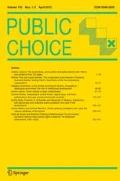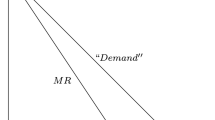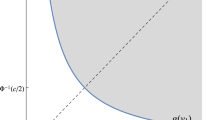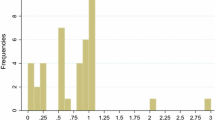Abstract
Many mechanisms (such as auctions) efficiently allocate an asset to the firm which values it most highly. But sometimes the asset’s owner may benefit from the transfer only if the asset is not too valuable to potential buyers. In this setting, we examine the efficiency of mechanisms when the potential buyers have private information about the asset’s value. We show that rent seeking, and lobbying, rather than merely wasting resources, can lead to allocations which are close to efficient.
Similar content being viewed by others
References
Baron, D., & Myerson, R. B. (1982). Regulating a monopolist with unknown costs. Econometrica, 50, 911–930.
Bhagwati, J. N. (1982). Directly unproductive, profit-seeking (DUP) activities. Journal of Political Economy, 90, 988–1002.
Hansen, J. M. (1991). Gaining access: congress and the farm lobby, 1919-81. Chicago: University of Chicago Press.
Kingdon, J. W. (1984). Agendas, alternatives, and public policy. Boston: Little, Brown, and Company.
Konrad, K. A. (2003). Multi-battle conflict. Working paper. WZB and Free University of Berlin.
Krehbiel, K. (1991). Information and legislative organization. Ann Arbor: University of Michigan Press.
Krueger, A. O. (1974). The political economy of the rent-seeking society. American Economic Review, 64, 291–303.
Lagerlöf, J. (2005). A simple theory of rent seeking with informational foundations. Paper presented at the WZB conference on special interest politics.
Lohmann, S. (1995). Information, access, and contributions: a signaling model of lobbying. Public Choice, 85, 267–284.
Lohmann, S. (1998). An information rationale for the power of special interests. American Political Science Review, 92, 809–827.
Posner, R. (1975). The social costs of monopoly and regulation. Journal of Political Economy, 83, 807–827.
Rasmusen, E. (1993). Lobbying when the decisionmaker can acquire independent information. Public Choice, 77, 899–913.
Smith, R. A. (1984). Advocacy, interpretation, and influence in the US Congress. American Political Science Review, 78, 44–63.
Smith, R. A. (1995). Interest group influence in the US Congress. Legislative Studies Quarterly, 20, 89–139.
Tirole, J., & Dewatripont, M. (1999). Advocates. Journal of Political Economy, 107, 1–39.
Tullock, G. (1967). The welfare cost of tariffs, monopolies, and theft. Western Economic Journal, 5, 224–232.
Tullock, G. (1972). The purchase of politicians. Western Economic Journal, 10, 354–355.
Wright, J. R. (1996). Interest groups and Congress: lobbying, contributions, and influence. Boston: Allyn and Bacon.
Author information
Authors and Affiliations
Corresponding author
Additional information
We are indebted to David Malueg, the associate editor, and to three referees for valuable comments.
Rights and permissions
About this article
Cite this article
Bucovetsky, S., Glazer, A. How to avoid transferring a valuable asset. Public Choice 138, 3–8 (2009). https://doi.org/10.1007/s11127-008-9306-x
Received:
Accepted:
Published:
Issue Date:
DOI: https://doi.org/10.1007/s11127-008-9306-x




